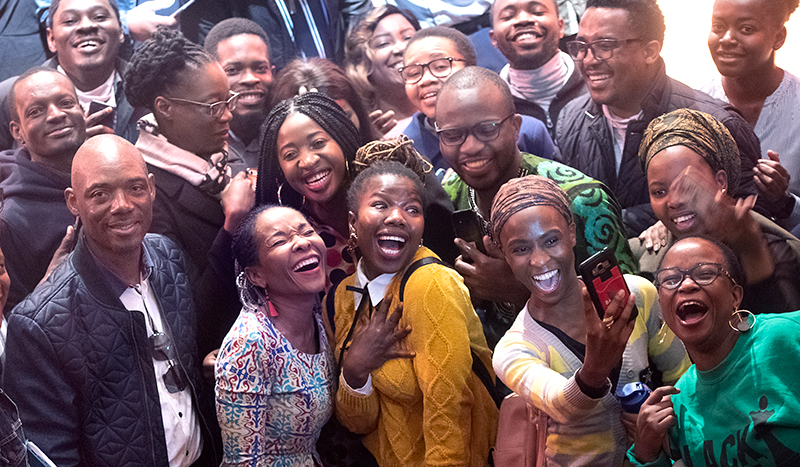VC’s top career tips for postgrads
06 August 2019 | Story Nadia Krige. Photos Brenton Geach. Read time 8 min.
Focus. Discipline. Passion. Those were the three traits highlighted as essential to building a rewarding career in academia by Vice-Chancellor Professor Mamokgethi Phakeng during her address to University of Cape Town (UCT) postgraduate students at an event hosted by UCT's Careers Service.
The students, from across the university, gathered in the Baxter Theatre’s Concert Hall on Saturday, 3 August to hear Phakeng share wisdom and insights from her own career.
She took a warm, light-hearted approach to a topic that often weighs heavily on the shoulders of aspirant academics, and her audience responded with laughter and delight.
Many grabbed the opportunity to ask some heartfelt questions – from how to deal with negativity and criticism, to knowing whether to pursue further studies abroad or plough knowledge back into the local community.
Some had gone the proverbial extra mile to attend this special lecture.
Able Benson Lungu, who is completing his MSc in project management, was one of these, travelling all the way from Mafikeng in North West for the weekend.
“It’s exciting to have such a passionate vice-chancellor who enjoys engaging and interacting with students,” Lungu said.
“She’s a very good orator and I love to listen to her speeches online. I find her to be very inspiring and relatable. So, when I heard this lecture was happening, I made a point to attend.”
“If you’re going to have a career, it’s your business. You take charge of it and you have to be the one doing the work.”
Career versus job
Phakeng started her lecture by advising the students on the value of creating a clear differentiation between their career and the various positions in which they may find themselves working during their lifetime.
“There is a huge difference between a career and a job: A job is what you do for someone else. A career you do for yourself,” she said.
“A career is much bigger than your job. If you are lucky, your job is a subset of your career.”
She added that it is helpful to think of the two as existing as concentric, intersecting or even separate circles – as long as it’s possible to distinguish between them.
Having a clear vision of what students would like to achieve in their careers will help them make some of their most important life decisions: which opportunities to accept, which to turn down and for what they should sacrifice their own resources.
“At the moment, I’m Vice-Chancellor. It’s a five-year contract. In my view, this is my job,” Phakeng said.
“But my dream was not to be a VC. It was to be the top academic in my field. That’s my career.”
Your career is your business
Once they have mapped out what they’d like their career to look like, the hard work starts, she told her audience.

“If you go into academia, don’t expect these things to be organised by someone else,” she warned.
“If you’re going to have a career, it’s your business. You take charge of it and you have to be the one doing the work.”
Phakeng added that while academia requires long hours and lots of multitasking – dividing time between teaching, research, administration etc – it is also one of the most rewarding careers for anyone with a curious mind.
“Here, we have an open space of ideas. For me that was the attraction to academia: being able to pursue the questions that you are passionate about and [which] are of particular importance to society.”
Setting critical benchmarks
Measuring personal progress – or lack thereof – is of the utmost importance in carving out a successful career. To do this, she said, every young academic should have a set of personal benchmarks.
She listed the following as the benchmarks she used to measure her own growth:
- Achieving a PhD.
- Getting published in high-quality journals.
- Successfully applying for research grants.
- Supervising masterʼs and PhD students.
- Having an impact on community, education and development.
- Invitations to give keynote or plenary lectures.
- Research awards.
She emphasised that each young academic’s set of benchmarks should be crafted according to their personal career goals rather than being informed or limited by any outside expectations.
She added that many people would include receiving a title such as “senior lecturer” or “professor” as a benchmark. However, since there is no universal set of criteria for the bestowing of these titles at universities, they could be misleading.
“Be sure to focus on benchmarks that are not dependent on your institution.”
“Make the most of the opportunities you have, because you never know when other people might recognise you and your talents.”
The importance of nurturing relationships
While it is important to remain focused on their goals – and not to become consumed by their achievements and failures – it's also vital to build relationships, Phakeng said.
“Building your career isn’t just about you getting the As and graduating, it’s about you building relationships. And sometimes we neglect that.”
Over the course of an academic career, Phakeng told the students they may find themselves cultivating a wealth of relationships, but that there are a few that deserve more nurturing than others.
Firstly, their relationship with their fellow students may stand them in good stead later in life when everyone is rising to the top of their field. Secondly, choosing specific communities to which to belong and contribute – often in the form of conferences – is important, as it can help them establish themselves firmly in a specific field.
Finally, but perhaps most importantly, the relationship they build with their supervisor has the potential to last a lifetime, so it needs to be robust.
“I can tell you this, your supervisor is your best buddy! Because that’s the person who wants you to succeed more than anyone else.”
Phakeng warned the students that while it may be tempting to go up against their supervisor over ideas and differences, it will rarely be worth it.
“Don’t start a war where it’s not necessary. You’re going to need that supervisor. It’s a relationship that you want to have for life.”
Never shy away from making an impression
Throughout their academic careers, they will have many opportunities to make an impression – through their essays as an undergraduate, to the questions they ask during a conference, she said.
And as “you never know who may be watching or listening, always make sure that what you deliver is your best possible work”.
“Make the most of the opportunities you have, because you never know when other people might recognise you and your talents.”
Phakeng concluded her lecture by reminding the students that success is a journey and not a destination.
“The day we think we have arrived, mediocrity sets in.”
 This work is licensed under a Creative Commons Attribution-NoDerivatives 4.0 International License.
This work is licensed under a Creative Commons Attribution-NoDerivatives 4.0 International License.
Please view the republishing articles page for more information.




























































































































































































































































































































































































































































